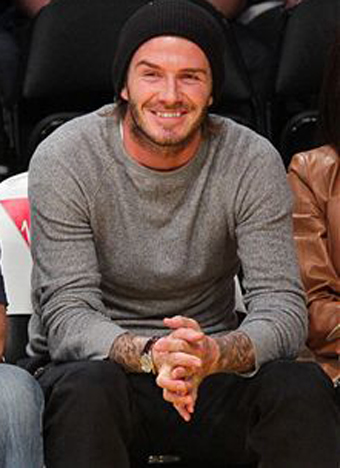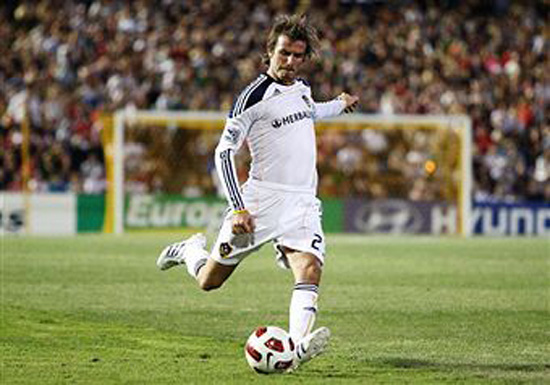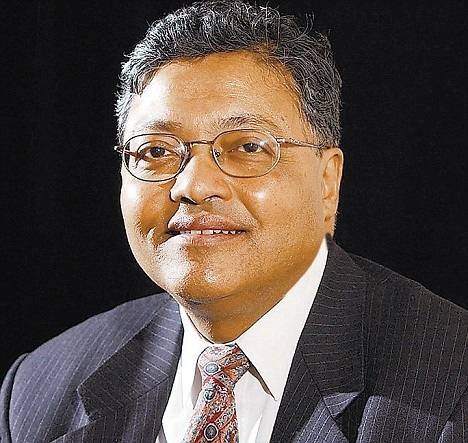Has David Beckham done something that no other footballer has ever managed?
I do not mean his setting the pace among male fashion models, or the fact that he is now tutoring the next generation of Beckhams to be fashion models as well.
His eight year old son Romeo is now 26th in GQ magazine’s top 50 best-dressed men in Britain list, not that far behind David, who is 16th.
What I mean is has he become the first footballer to effectively become a free agent? Whether we see Beckham back in the Premier League or not, the fact is, the whole business shows that Beckham has gone where Carlos Tevez and others would like to go and cannot.
Now, free agency is something that all modern day footballers want. Indeed, leading agents like Jon Holmes, who in the days when his company represented David Beckham, argued that the fact that footballers could not move without the permission of their clubs was a feudal hangover that needed to change.
He has felt for a long time that changes in the way football is run, dictated by overall changes in society, would free footballers from being shackled to clubs. It was partly such pressure that led to the great transfer debate at the beginning of this century.
Players and their International Union wanted more freedom, the professional leagues resisted it, and the European Union eventually got involved. The resulting discussions with FIFA about transfers, did give the players more freedom, but the essential chain that tied players to clubs, the player’s registration system, remained.
 Then, professional leagues successfully argued that without such an arrangement, it would be impossible for clubs to build teams, let alone retain them. Without the club transferring this document to another club, either on a permanent transfer or on loan, a player cannot move. Whether he likes it or not, as Carlos Tevez found out, he has to stay where is.
Then, professional leagues successfully argued that without such an arrangement, it would be impossible for clubs to build teams, let alone retain them. Without the club transferring this document to another club, either on a permanent transfer or on loan, a player cannot move. Whether he likes it or not, as Carlos Tevez found out, he has to stay where is.
But observe how Beckham has got round this. In the last two seasons, while being a LA Galaxy player, he has played for AC Milan. As this is being written, there is much talk that he may be back in the Premier League, whether for Tottenham or some other club.
Of course, Beckham’s circumstances are very different to other players. Tevez, in the Premier League, does not have a long off-season that can be exploited.
However, observe how the move by Beckham to play on loan on another continent is seen, not as betrayal or greed, as it would be in the case of Tevez or any other player in the Premier League, but as a sign of Beckham’s commitment to football.
So, Harry Redknapp, keen to sign “Golden Balls”, praised him for wanting to tackle mud, sweat, snow and ice in England, instead of just lazing in Los Angeles. Here is a man who does not need the money.
Indeed, says Harry, he has enough to buy a club or two himself, but his thoughts are always about football – what can he do to improve himself? What can he put his body through to become even better? This is not the ordinary, greedy, football mercenary, but an exceptional man.
Yes, his club has to agree, and they still have the final say. But it is quite clear that if the move, say to Tottenham, takes place, it is Beckham who will have pulled all the strings.
This, it would seem, started from the moment he met Jamie Redknapp, son of Tottenham’s manager, at Harrods to suggest a move to White Hart Lane. Beckham, I am sure, was well aware that when it comes to recruiting players, Harry listens to his son, something Harry has made no secret of.
But what is even more interesting are the fulsome references he made to Tottenham just over a month ago when he was part of the presentation team in Zurich as England made their bid for the 2018 World Cup.
Like everything Beckham does, this was polished and finely honed, and looking back, I suspect it was also a pitch for a possible move to Tottenham. Not that Beckham said anything about a move to Tottenham or anything remotely like that. That would not have been the place or the occasion for it.
No, what he spoke of was his love for his granddad, who was a passionate Tottenham fan – how he would give him mementoes from the Lane and take him there.
All this was meant to make the point that in England, boys grow up with football, that the passion for the game is part of the birthright of the English. It was all designed to convince FIFA Executive members that if they chose England, there could be no doubt they would be going to a country whose love for the game was unmatched.
However, since Beckham’s interest in Tottenham emerged, it is interesting to look back at the speech and compare it with Beckham’s own autobiography, David Beckham, My Side, published in 2003.
There, you really have to search for references to his granddad. They are there, but nowhere as fulsome as in that Zurich speech.
The opening chapter, describing his East End upbringing, is all about his dad, the original Cockney red, whose love for Manchester United made it inevitable that Beckham would sign for United, not Tottenham.
He may have trained with Spurs, but his dad’s affiliations dictated the choice of his first professional club. The chapter is a fine illustration of the boy paying due homage to the father who helped shape his life.
Yet in the 2018 Zurich speech, there was no reference to dad, which would have done just as well to highlight a boy’s passion for the game.
 All references were about granddad. Call me cynical, but is it not possible that Beckham chose his granddad in December because he wanted to send a message to Tottenham?
All references were about granddad. Call me cynical, but is it not possible that Beckham chose his granddad in December because he wanted to send a message to Tottenham?
If there is one thing that has distinguished Beckham’s career, it has been his ability to plan ahead, know what he wants, and how to adjust his career so that it is always progressing forward. This may be advanced planning, it may be calculation, but no one in modern football does it better.
It helps that in the current situation, Beckham is in a position with LA Galaxy that he can do that. But I am sure he thought about that when he moved to America. Many called it a dead end. Beckham saw it as an opportunity, one where he could even get round the feudal constraints of the contract registration.
Whichever club Beckham ends up with, this whole episode illustrates, once again, Beckham’s ability to reinvent himself. He first demonstrated it back in 1998 after the disaster against Argentina when he was sent off, England lost, and the Mirror called him the idiot who had let down his fellow English lions.
Many others were much more abusive than the Mirror and there was concern about what effect this would have on him.
But he survived and re-established himself so well, going on to score a vital goal that eliminated Argentina in the subsequent World Cup, that the whole episode was seen as of no lasting consequence.
Now it is Beckham who is emerging as the clever lion, while many of his contemporaries, who would like to do the same, are condemned as fools or worse.
Mihir Bose is one of the world’s most astute observers on politics in sport and, particularly, football. He formerly wrote for The Sunday Times and The Daily Telegraph and until recently was the BBC’s head sports editor

